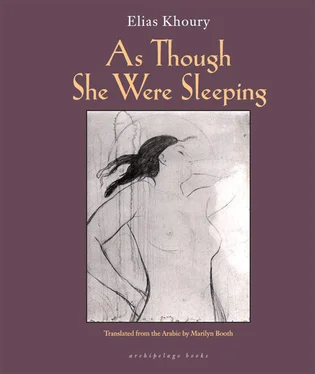Elias Khoury - As Though She Were Sleeping
Здесь есть возможность читать онлайн «Elias Khoury - As Though She Were Sleeping» весь текст электронной книги совершенно бесплатно (целиком полную версию без сокращений). В некоторых случаях можно слушать аудио, скачать через торрент в формате fb2 и присутствует краткое содержание. Год выпуска: 2012, Издательство: Archipelago Books, Жанр: Современная проза, на английском языке. Описание произведения, (предисловие) а так же отзывы посетителей доступны на портале библиотеки ЛибКат.
- Название:As Though She Were Sleeping
- Автор:
- Издательство:Archipelago Books
- Жанр:
- Год:2012
- ISBN:нет данных
- Рейтинг книги:3 / 5. Голосов: 1
-
Избранное:Добавить в избранное
- Отзывы:
-
Ваша оценка:
- 60
- 1
- 2
- 3
- 4
- 5
As Though She Were Sleeping: краткое содержание, описание и аннотация
Предлагаем к чтению аннотацию, описание, краткое содержание или предисловие (зависит от того, что написал сам автор книги «As Though She Were Sleeping»). Если вы не нашли необходимую информацию о книге — напишите в комментариях, мы постараемся отыскать её.
As Though She Were Sleeping — читать онлайн бесплатно полную книгу (весь текст) целиком
Ниже представлен текст книги, разбитый по страницам. Система сохранения места последней прочитанной страницы, позволяет с удобством читать онлайн бесплатно книгу «As Though She Were Sleeping», без необходимости каждый раз заново искать на чём Вы остановились. Поставьте закладку, и сможете в любой момент перейти на страницу, на которой закончили чтение.
Интервал:
Закладка:
The story that Yusuf did know was the one about his parents’ nocturnal wedding. The girl had insisted on one thing only: that she would marry Salim Shahin after dark. She emerged from the house swathed in her long black gown, surrounded by her father, her three sisters, and their husbands. The nighttime gloom mantled the funereal bridal procession. At the church door Salim stood waiting, decked out in a gold-embroidered silk abaya and red tarbush. He waited alone as the bride had requested. They stood before the candle-lit altar and Father Andraos blessed their marriage. They went to his house on foot, although the groom had arranged for a carriage pulled by four horses. The bride refused and said she preferred to walk. Her arm tucked into her husband’s arm, they disappeared silent into the surrounding night.
Did Salim learn the story of Ferdinand and plot revenge on his wife? Or was what Yusuf believed to be revenge simply Salim’s response when it became clear that he would not beget more than one child, after he contracted the mumps that descended as far as his testicles?
How can this story be? Milia asked her mother. Someone dawdles away his life waiting to get married and then as soon as he’s married, he starts feeling he has to look for something else?
That’s men for you, my girl — when a man has nothing left, nothing to fill his life, this is what happens. You see, a man who isn’t capable of giving life feels empty. He starts talking bull and he’s full of ridiculous mischief. May God protect us all!
From his wife Salim learned to turn the darkness into a curtain veiling his life. That was Hasiba for you. She never really woke up or got up except at night. She cooked to the flame of the oil lantern and when her husband left for his shop in the morning she snuffed out the light and went to sleep.
It was Yusuf who convinced her finally about the new house. Mama, open your mind up a little — it’s just a house like any other. When Hasiba discovered that her husband had bought the house that Khawaja Sergios Efthymios had built for his Egyptian lover, who had then become Salim’s mistress — which everyone more or less knew about — she went out of her mind, screaming and raving at her husband.
It was only then — during the time that witnessed the woman’s fierce sadnesses, her sobs and her sense of betrayal and shame — that Hasiba came to know the story of the rock that had nearly taken out her only son’s eye. It was around this time that the family moved into the house Salim had bought from the heirs of Khawaja Efthymios after the Egyptian lover’s death. Hasiba was not so angry about a straying husband: she felt pity for the man — for all men, as she told her only son. But for things to reach the point where she would live in this hovel surrounded on every side by trees and infested with freely roaming snakes and spiders, for the sake of Salim’s fidelity to his Egyptian mistress — it was too much to bear, even for Hasiba.
No one asked Hasiba how she knew of her husband’s relationship with his Egyptian paramour. She learned of it after the story had become generally known. And stories that are known have no need of a storyteller: they are like smells that mount and expand and penetrate everything around them. The reek of this scandal rose and spread, and the woman wrapped herself in blackness once again.
What floored and upset her was his treachery. That gutless cringing son of a bitch! she called her husband. And that’s what he was. No man known to anyone ever feared his wife as the carpenter feared Black Hasiba. And then suddenly the woman discovers that behind this pusillanimous exterior hid a sneaky weasel bent on getting revenge.
But what would he avenge, someone in Salim’s condition? His predicament was not to be envied. After the birth of his son, Yusuf, Salim got a bad case of mumps. Normally it was children who came down with Abu Ku’Ayb’s Sickness, as it was called — a reference to swelling in the glands. When adult men got mumps it was far more serious: Abu Ku’Ayb could make a man sterile. If the disease sank all the way to the testicles, it was all over.
And that is what happened to Salim. The man had a bad case of it and he suffered long and hard from the malign disease. The physician who treated ailments according to old Arab practices came more than once. He prescribed various bitter herbs that Salim was to steep and drink. Once he was finally pronounced well, the doctor told him that all recompense is God’s and he would not be able to sire any more children. He must be content with the one son who was God’s precious gift. The news affected Salim radically and events took a new turn: he was no longer capable of fulfilling his marital obligations, for suddenly everything in him went limp. He considered suicide. He consulted the doctor, who confirmed that the illness had destroyed his seed but would have no effect on his sexual prowess. The physician prescribed a strengthening medicine and advised him to breakfast on honey and pine nuts. But nothing could return the man to his masculine vigor. Nevertheless, pine nuts became an essential element in the family legacy. Yusuf had grown accustomed to eating them as a child, and the practice was passed on to his children. When Milia took over the kitchen, she made pine nuts into a staple, used in almost every dish she concocted. She added pine nuts to burghul , used them in stuffed vegetables, and garnished sweets with them. She even made her sweet pancakes with pine nuts, a practice unheard of in Beirut then and likely now. Only the “Milia Clan” ate this, a family extended through the brothers’ marriages and their success in convincing their wives to prepare the sweet in this fashion.
Though for the Lebanese, sunuubar was practically a synonym for Beirut, in truth pine nuts were an Egyptian accomplishment. It was Ibrahim Pasha — subjugator of Lebanon and Syria in the nineteenth century — who planted the pine-nut forest in Beirut, or perhaps replanted it, God alone knows. Salim breakfasted and dined on Ibrahim Pasha’s pine nuts dipped in honey but with no obvious outcome. Whenever he approached his wife at night, feeling life stirring within him, without warning he would collapse. Hasiba never said a word about it. She felt the heaviness of his chest above her as he tried, and then pulled back to turn away, claiming he was tired and needed to go to sleep. Salim tasted bricks of pure dirt and mud, as the Egyptians say, and nothing could save him: nothing except the Egyptian woman. Surely that was where he had dug up this expression, and how he found himself through a new dialect, in which he began to converse with his only son, relying on the lingo spoken by the grandsons of pharaohs. She said her name was Maryam and Salim was never able to verify the truth of it. She hailed from the unacknowledged childbirth bulges that Ibrahim Pasha’s military campaigns along the Syrian coastline had left behind. Now came the question that stymied young Yusuf. Who was this woman, really, and how had she entered the life of the family? The question cost him his right eye and implanted a sentiment that dogged Yusuf all his life, and that he passed on to his children: it was the uneasy feeling that a father could kill his son. When what had remained hidden and sheltered from view was revealed finally, Salim explained that he had believed Yusuf to be a thief who had stolen into the ancient house. The man threw a stone at the intruder, it never entering his mind that it might be his only son, trying only to steal puzzled glances at his father’s activities. The rock struck the boy in his eye and left it half closed for the rest of his life. Salim turned and strode back into his Egyptian lover’s home full of swagger.
But Maryam was not Salim’s lover, not really; she was another man’s lover. The tale was like a mass of tangled threads. Grandfather Salim never told anyone of his abiding relationship with the Egyptian woman. In his final days, when asked about it he would wax eloquent over the beauty of the almond tree for the sake of which he had bought the house, a foolish little grin on his lips. The true and original lover, Khawaja Sergios Efthymios, was not a married man. He had been among the first Lebanese to pull off his abaya and tarbush and put on European-style garb. A confirmed bachelor, he had studied architecture in Paris and was one of the generation of Lebanese architects who introduced Italian columns to the spacious Beirut homes being commissioned by the city’s wealthy silk merchants. Why would a bachelor embark on a surreptitious relationship which he was fierce about keeping under wraps? It was one of the secrets that the wealthy stratum of Beirut families harbored: families established only to collapse when men of the younger generation avoided marriage and honed a social tradition founded on the principle of a divided life — on the surface all piety and dedication to worship at church, while beneath the surface flourished illicit relationships with secret belles who could claim one of two genealogical strains. Either they were Egyptians, born out of Ibrahim Pasha’s military operations, and thus a much newer subspecies than the local Greeks. Or they were Greeks, a community said to have started with Alexander the Macedonian which was more recently embodied in a certain lady named Marika Spyridon — and that was another story.
Читать дальшеИнтервал:
Закладка:
Похожие книги на «As Though She Were Sleeping»
Представляем Вашему вниманию похожие книги на «As Though She Were Sleeping» списком для выбора. Мы отобрали схожую по названию и смыслу литературу в надежде предоставить читателям больше вариантов отыскать новые, интересные, ещё непрочитанные произведения.
Обсуждение, отзывы о книге «As Though She Were Sleeping» и просто собственные мнения читателей. Оставьте ваши комментарии, напишите, что Вы думаете о произведении, его смысле или главных героях. Укажите что конкретно понравилось, а что нет, и почему Вы так считаете.












